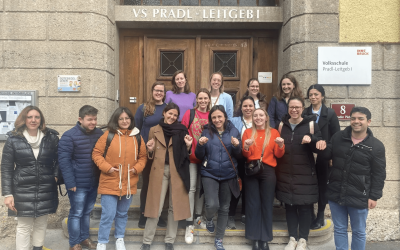
The P2T project addressed to migrant/refugee parents to allow them to be more involved in their children’s school pathway. It also targets primary and pre-primary school teachers as it facilitates the construction of a deeper and more productive relationship with these parents. One of the main goals of the project is to build a better communication between parents and teachers in order to more effectively help immigrant children in their school process.

PROJECT DURATION
01/10/2022 – 30/09/2024
The project is funded by the European Commission under the Erasmus+ programme – Cooperation Partnership in Adult Education.
THE OBJECTIVES
Empower
To empower migrant/refugee parents through workshops that help them improve the host country language, digital skills and the knowledge of the school and educational system.
Strengthen
To strengthen the competencies of migrant/refugee parents to support their children’s learning.
Improve
To improve parent-teachers relationships and interactions by enhancing the professional knowledge of school staff and their culturally sensitive competencies.
RESOURCES
A transnational report
Interactive workshops
A methodological manual
A Community of Practice
THE TARGET GROUPS
Migrant/refugee parents
Who, due to linguistic and cultural differences, struggle to fit into the local community but have the desire to acquire useful tools to get to know the school system of the host country and support their children in their school pathway.
Teaching professionals
Who face cultural and communication difficulties on a daily basis with parents coming from other countries and for this reason are interested in enhancing their intercultural skills.
Indirectly the children of migrant parents
Who will receive the benefits of the project through cross-generational impact as their learning attainment and school well-being will improve.
By extension native parents
Who may experience barriers and challenges in the communication with the school due to socioeconomic situation, physical and mental health, lack of digital skills and so on.
Social and community workers
Who will gain new knowledge regarding school improvement in terms of collaborative and inclusive didactical methodologies.
Compare with teachers from different European countries with Community of Practice P2T!
For some teachers, establishing fruitful communication with parents from different cultural backgrounds can be challenging and confusing. This is where the P2T steps in, offering support to educators and enabling them to explore various resources to...
School and families: P2T training for migrant parents starts in Palermo
Involving parents and teachers to better support students: this is the goal of P2T, a project that, through trainings and workshops, intends to offer useful tools to overcome linguistic and cultural obstacles and make a positive impact on pupils’ school life. In...
MIGRANT PARENTING AND DIALOGUE WITH THE SCHOOL: TRAINING IN INNSBRUCK ON THE SCHOOL/FAMILY RELATIONSHIP
Migrant parenthood represents an increasingly present reality in today’s society. This condition, often characterized by difficulties in integration and communication with schools, requires special attention from institutions and professionals in the field. On 21...



